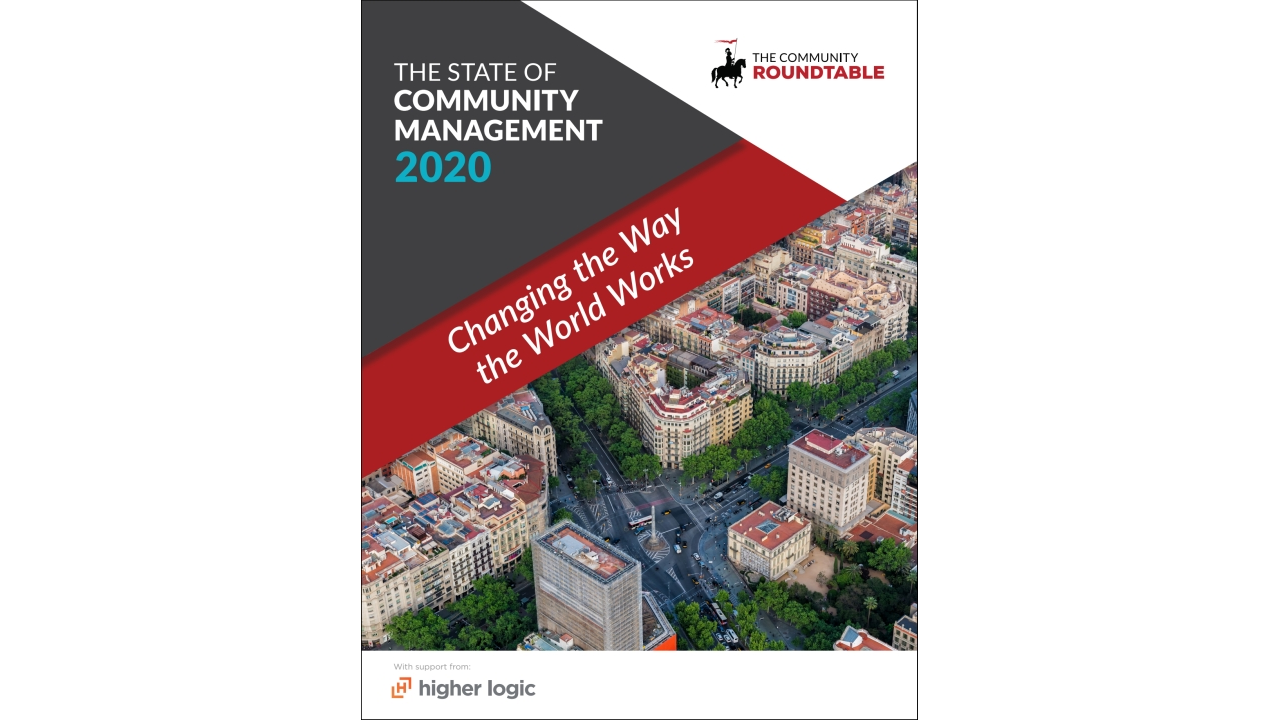
Report review – State of Community Management 2020
The Community Roundtable has released the State of Community Management 20201, presenting the findings of organisational research in regard to online communities and digital engagement. It is the 11th edition of the report.
The data for the report was collected from 324 community programs in early 2020, and further information in regard to the impact of the COVID-19 crisis was collected from an additional 213 respondents in April 2020.
Application and findings
The authors advise that the research can be used to:
- Validate and audit your approach
- Prioritize your resources
- Identify gaps & opportunities in your program
- Build a roadmap
- Justify budget requests
- Inform conversations with stakeholders
- Educate staff.
The key findings of the latest research are that:
1. Advanced Communities Create Generative Value
Advanced communities generate outsized returns and return more value to each set of stakeholders than is invested. As these communities age, costs decline and returns increase, creating a self-propelling and generative business model.
2. External Communities Elevate the Customer Experience
External communities deliver value throughout the customer experience. External communities improve customer value by providing access to other customers, increasing trust, delivering solutions, and generating new ideas. External communities empower customers and contribute positive brand impact, all while improving profitability.
3. Internal Communities Reveal Untapped Potential
Internal communities have vast potential to transform organizations by changing how employees work and learn. The most successful Internal Communities deliver complex business objectives like culture change, communications, brand awareness, and productivity. However, tantalizing indications of potential with Internal Communities are squandered by underinvesting in community management, even though there is more invested per member than in External Communities.
The report provides detailed recommendations in regard to each of these findings, and for the advanced communities finding, information is also provided on the impact of the Global COVID-19 crisis on community programs.
The findings in regard to external communities very much support the arguments that I’ve put forward in regard to the benefits that external communities could bring to companies such as Boeing and Toyota. The failure of these companies to effectively engage with their external communities has has deadly consequences.
Limitations of the research
While the State of Community Management 2020 research report provides useful information and recommendations, most if not all of the online community platforms used for the research population appear to be headquartered in North America. The demographics section of the report shows that of the eight companies which provide the top five internal program and top five external program primary platforms used in the research sample, six are headquartered in the United States and two in Canada. This is despite the report having the statement “Changing the Way the World Works” on the cover.
The very narrow focus on community platforms from just one part of the world means that the research has unfortunately not documented or benefited from the extensive experiences of the online communities that are operating in other parts of the world, such as in Asia. Highlighting the great value of these experiences, the introductory chapter2 of the scholarly book Asian Perspectives on Digital Culture: Emerging Phenomena, Enduring Concepts states that:
Digital, networked media have been embraced by countries throughout the globe, and Asia is at the very forefront of this trend. Amidst the region’s diverse cultural traditions and political systems, internet and mobile communication are increasingly deployed in every aspect of life, instigating novel modes of interaction and collaboration, and birthing technological breakthroughs and innovative applications
For example, as I reported in a previous research summary3, an academic study shows that one of the most significant global examples of innovative external online collaboration is the iterative innovation approach practised by Chinese electronics maker Xiaomi.
The focus of the State of Community Management 2020 research on community platforms from just one part of the Global North is unfortunately an example of knowledge colonialism. It is hoped that the future research activities of the Community Roundtable could become much more globally representative.
References and notes:
- Website registration required for report download. ↩
- Lim, S.S., & Soriano, C.R.R. (2016). A (digital) giant awakens – Invigorating media studies with Asian perspectives. In Asian Perspectives on Digital Culture (pp. 3-14). Routledge. ↩
- Ortiz, J., Ren, H., Li, K., and Zhang, A. (2019). Construction of Open Innovation Ecology on the Internet: A Case Study of Xiaomi (China) Using Institutional Logic. Sustainability 11(11): 3225. ↩
Also published on Medium.






